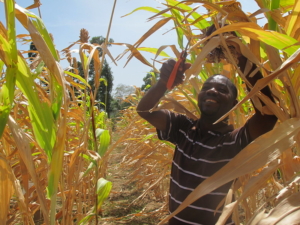Revitalizing Haiti with Agroecology
 Social and economic progress in Haiti has suffered negative impacts from factors such as natural disasters, political unrest and violence. According to the World Bank, Haiti ranks as the poorest nation in Latin America and the Caribbean (LAC) region. Due to high levels of poverty and food insecurity, international aid efforts have not yet yielded desired results. However, agroecology seems to be steering Haiti toward the direction of progress.
Social and economic progress in Haiti has suffered negative impacts from factors such as natural disasters, political unrest and violence. According to the World Bank, Haiti ranks as the poorest nation in Latin America and the Caribbean (LAC) region. Due to high levels of poverty and food insecurity, international aid efforts have not yet yielded desired results. However, agroecology seems to be steering Haiti toward the direction of progress.
Haiti’s Problems
The political landscape in the country has been tumultuous. After years of dictatorship since the late 1950s which drained Haiti economically, it had its first democratically elected leaders in the 1990s. Nonetheless, prevalent corruption and multiple coupes prevented the national government from bringing positive change to Haiti. More recently, in 2021, the country’s former president Jovenel Moïse was assassinated. Gang-related violence has also been a threat in many parts of the country.
On top of these struggles, Haiti is vulnerable to natural disasters such as earthquakes and hurricanes. The World Bank reports that “more than 96% of the population is exposed to these types of shocks.” A devastating earthquake struck the country in 2010, killing 220,000 people and causing significant damage. According to the Council on Foreign Relations, “at $8 billion, basic reconstruction costs surpassed the country’s annual GDP.” In 2021, an earthquake struck the country and caused more than 2,000 deaths.
All these challenges have contributed to a rise in poverty in Haiti. According to the World Bank, the nation had a Gross National Income (GNI) of $1,420 in 2021. This was the lowest in the LAC region which had an average GNI of $15,092 around the same period. The World Bank’s reports suggest that Haiti’s economy has been in decline since 2019.
Past Aid
Haiti has received aid from the global community in times of need. For example, the U.S. has been providing much of its aid through the United States Agency for International Development (USAID). In January 2023, USAID pledged $56.5 million to fight the current cholera outbreak in Haiti. Also, since 2010, the U.S. has provided more than $5.6 billion to support the country.
The European Union also assists Haiti in times of vulnerability, and this was the case during the 2010 and 2021 earthquakes. Since 1994, the EU has spent €471.5 million in aid to Haiti. Other organizations like the British Red Cross also provide vital support during natural disasters.
While these efforts have evidently helped Haiti achieve results in difficult times, the issues of poverty and food insecurity still remain in the country.
Agroecology in Haiti
Agriculture is a major part of Haitian people’s lives, with around 30% of Haiti’s workforce depending on it. In response to this, organizations such as Partenariat pour le Développement Local (PDL) are exploring agroecology as a potential solution to poverty and food insecurity.
According to the Food and Agriculture Organization of the United Nations (FAO), “agroecology is an integrated approach that simultaneously applies ecological and social concepts and principles to the design and management of food and agricultural systems.” It explores the interconnectedness of the various elements of an ecosystem and utilizes it to increase agricultural productivity.
The Haiti Center for Agroecology (HCA) aims to utilize this unique aspect of agroecology to boost the agricultural productivity of local subsistence farmers. The HCA believes that industrial agriculture and mass production can push nations like Haiti into depending on international support. For this reason, the organization works toward educating and supporting farmers through the principles of agroecology, while strengthening the local economy and environment. It offers various on-site research and educational opportunities that focus on improving food security and self-reliance.
As an NGO and member of Groundswell International, PDL plays a significant role in advocating for agroecology in Haiti. Groundswell International is a coalition of organizations promoting agroecology in the Americas, Africa and Asia. PDL’s mission includes empowering local communities and farmers to sustain themselves.
Haiti Agroecology Reports and Policies
A report by the Economic of Land Degradation (ELD) states that PDL endorses “the 13 agroecological principles consolidated by the international High-Level Panel of Experts on Food Security and Nutrition in July 2019, based on the 10 elements proposed by the FAO in 2018, as well as the gradual transformation of agri-food systems from farm to wider societal levels.”
Since government programs that support agriculture in Haiti are minimal, PDL aims to decrease the reliance of local farmers on external support by creating farmer communities and associations and teaching them self-reliance.
Typically, PDL organizes up to 15 people into small groups called gwoupman. Each group comprises people working toward shared interests. Having multiple gwoupman within a village allows farmers to share agroecological concepts and resolve any issues by themselves. In essence, gwoupman groups enable easy connection or communication between communities across several villages.
The ELD Initiative released a policy brief based on a study in which PDL and Groundswell International took part. It showed that embracing agroecology leads to increased productivity, water retention, carbon sequestration and food security, along with reduced topsoil loss and mudslides.
The study revealed the economic benefits of agroecology over conventional farming. According to the study, conventional farmers make only half as much income as farmers that implement agroecology.
What’s Next?
Several studies have shown that agroecology can help in alleviating food insecurity in Haiti. While the country’s poverty issues persist, organizations like PDL and Groundswell International continue to make progress in getting local farmers to adopt agroecology. With more progress, there may yet be hope for economic prosperity in the future.
– Siddhant Bhatnagar
Photo: Flickr
